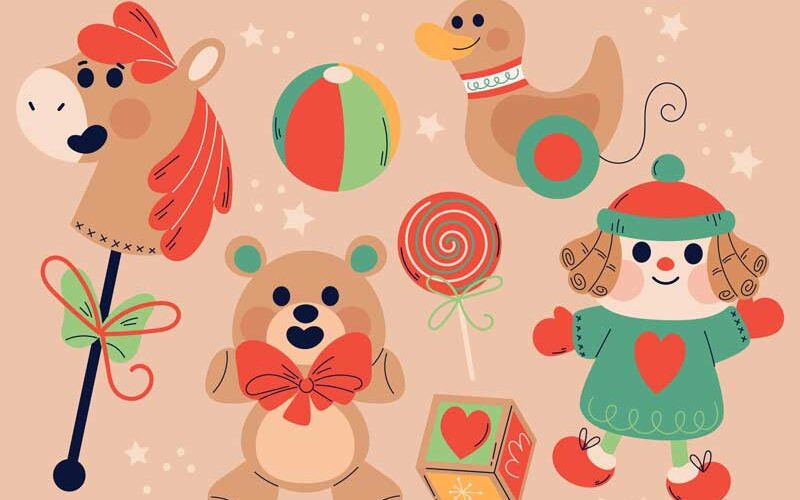Stuffed animals hold a cherished place in the hearts of children, offering more than just cuddly companionship. These plush toys play a vital role in nurturing a child’s emotional well-being and development. Beyond their undeniable cuteness, stuffed animals offer comfort and a sense of security, serving as trusted confidants and sources of solace during times of distress or loneliness. Research underscores the significant impact these furry friends have on children, highlighting their role in fostering emotional resilience and aiding in the processing of difficult experiences. In a world filled with a myriad of toy options, stuffed animals persist as timeless favorites, their importance transcending mere playthings to become essential tools in supporting children’s growth and happiness.
Comfort and Security Benefits of Stuffed Animals
Stuffed animals serve as more than mere toys; they act as comforting companions that play a pivotal role in fostering children’s sense of security and emotional well-being. Through their soft textures and familiar presence, these plush companions offer a source of comfort and reassurance, particularly during bedtime routines. Research conducted by Devon Golem and colleagues delved into the significance of stuffed animals in children’s sleep habits, revealing that these cuddly toys are often pivotal in facilitating quality sleep experiences for young ones (Lai, 2021). Such findings underscore the profound emotional attachment children form with their stuffed animals, which extends beyond nighttime rituals to provide solace during separations, such as daycare or unfamiliar environments.
Moreover, studies indicate that the presence of stuffed animals correlates with lower levels of anxiety and heightened feelings of security among children. These furry friends act as guardians, offering a sense of protection and companionship that can alleviate distress in various situations. Notably, research suggests that plush animals can even play a role in pain management, whether it be for children undergoing medical procedures or individuals grappling with post-traumatic stress disorder (PTSD) and trauma (Collins, 2023). Thus, the significance of stuffed animals transcends their cuddly exterior, affirming their indispensable role in nurturing children’s emotional resilience and overall well-being.
Stuffed Animals’ Crucial Role in Children’s Development
Stuffed animals play a pivotal role in fostering various aspects of children’s development, including their reading habits and ability to cope with pain. Research conducted by Yoshihiro Okazaki and colleagues in 2017 showcased the effectiveness of utilizing stuffed animals to encourage reading among preschoolers. Through a program where stuffed animals spent a night in a library and interacted with children through notes, the study found a significant increase in children’s inclination to read, as evidenced by their engagement with books both during and after the program (Lai, 2021). Similarly, studies led by Anna Ullán and her team revealed that stuffed animals can aid in pain management for children post-surgery. By engaging children with their plush companions after surgery, researchers noted a decrease in pain levels among those who received this intervention, highlighting the therapeutic benefits of stuffed animals in alleviating discomfort and distress (Collins, 2023).
Moreover, the role of stuffed animals extends beyond mere play; it serves as a catalyst for fostering essential skills such as language development, problem-solving, and empathy in children. Through imaginative play and storytelling with plush toys, children not only enhance their linguistic abilities but also cultivate social and emotional intelligence. Role-playing scenarios with stuffed animals provide a safe space for children to explore different roles and relationships, promoting empathy and social skill development (Collins, 2023). Thus, stuffed animals emerge as multifaceted tools that not only entertain but also nurture children’s cognitive, emotional, and social growth in diverse and meaningful ways.
Conclusion
In conclusion, stuffed animals hold a significant place in the lives of children, providing them with comfort, security, and solace during challenging times such as trauma, loneliness, and medical procedures. Research underscores their pivotal role in shaping children’s sleep habits and alleviating anxiety, highlighting their importance in promoting overall well-being. Furthermore, beyond their immediate benefits, stuffed animals contribute substantially to children’s cognitive, language, social, and emotional development. Through imaginative play and interaction, these plush companions facilitate the acquisition of essential skills and foster empathy and creativity. It becomes evident that stuffed animals transcend the realm of mere toys; they emerge as indispensable partners in nurturing children’s growth and holistic development, serving as comforting companions that accompany them through the joys and challenges of childhood.
References
Collins, M., 2023. Why Are Stuffed Animals Important — They’re More Than Just Toys. Available at: <https://babame.com/why-are-stuffed-animals-important/> [Accessed 18 January 2024]. Lai, V. 2021., The Positives Of Plushies: Stuffed Animals Have Benefits For Children And Adults. Available at: <https://icjs.us/the-positives-of-plushies-stuffed-animals-have-benefits-for-children-and-adults/> [Accessed 18 January 2024].
